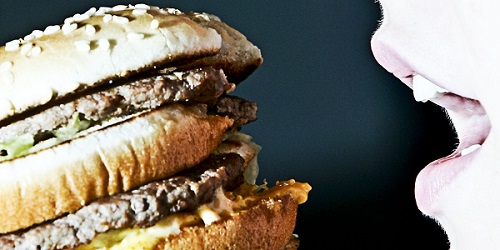
By James Fell
AskMen
For decades, "the man" warned that dietary fat (specifically the four-legged kind, not the plant kind) caused clogged arteries, chest pain and pleas to "Call 911!"
Could be that this was just a causation-correlation mix-up.
See, people who are obese and sedentary just happen to have diets that are really high in fat (as a general rule). They are also more likely to have high cholesterol and heart failure. The dietary fat may have indirectly caused the problems, but it was the body fat (and the lack of activity) that was the main culprit. Yes, you can be in the "overweight" category and be perfectly healthy, but once you start getting up into +30 BMI (assuming you’re not really muscular), the dangers to your health begin to arise. The higher the BMI, the more at risk you are.
Not necessarily at higher risk of "mortality" but "morbidity." This means life takes a nosedive with illness and infirmity at higher body weights. People still live a long while, but the obese are more likely to spend time in hospital beds with tubes in orifices and other nasty medical sh*t.
Eat cow. Put butter on stuff. Cheese it up. As long as calories are in check and body weight isn't high, your health should be fine. (Side note: stay away from trans fats, because they're way bad. The types of foods you find trans fats in are usually processed to hell. Processed food is the real enemy.)
So the saturated cow-cheese-butter fat isn't that bad if you're not overdoing it and don't have a high percentage of body fat. And the avocado-salmon-olive kind of fats are good for you, so get on that. But overall, if you have a high percentage of fat in your diet, you're at a higher risk of being fat, and that's not good.
There are four reasons why eating fat can make you fat:
1. The thermic effect of food for fat is very low
What is the thermic effect of food? TEF is the calories food burns by being digested. Cool, right? When you eat protein, which has a high TEF, roughly 20% of those calories are freebies; they’re burned off because your digestive system has to work harder to process them.
Carbohydrates don't have as high a TEF as protein, coming in at around 10%, but they still blow away the TEF of fat. Fat’s TEF is a subject for debate, but most put it at below 5% and as low as 2 percent.
So when you eat fat, very few of those calories are freebies. In the grand scheme of things, TEF isn't a huge factor, but it all adds up.
2. Fat isn't satiating
Dr. Raylene Reimer, a registered dietitian and associate professor of nutrition and metabolism at the University of Calgary, told me this about macronutrients and satiety: "Protein has the highest satiety factor of the three macronutrients. Carbohydrates come second, and fat is hardly satiating at all."
This is a statement supported by research like this, this and this. As you'll see in No. 4, it actually can have the opposite effect.
3. Fat is high in caloric density
This boils down to some basic math. Protein and carbohydrates only have four calories per gram, but fat has nine.
As an extreme example, an entire pound of fresh spinach (which has a high water content as well) has roughly the same number of calories as a single tablespoon of butter. Guess which one is more satisfying to your appetite? Which one is easier to consume a lot of? With fat, you get a big wallop of calories in a small volume of food, so it's just a lot easier to shovel a bunch more in without making your stomach feel full.
4. Fat makes things taste great
Try this experiment. Take a piece of bread and toast it. Now eat it. No, not with butter, just by itself. Not so great, right?
Now toast another piece of bread, but this time put butter on it. Tastes way better, doesn't it? You took a 100 calorie piece of toast, added 50 calories worth of butter, and that made it taste so much better you could eat two pieces. Maybe even three.
Our desire to eat fat dates back to Stone Age times, because for most of human history, we didn't have a grocery store down the street. So our brains became wired via evolution to seek out foods that were high in energy value to help us store fat for the next time there was a drought or you were too chicken to chase down that mammoth and stab it to death so the tribe could have hairy elephant meat for the next few weeks.
A pile of research shows that fat makes food taste better, and therefore people eat more of it. So it's not just added calories from fat, but added taste that makes you eat more. It's not just buttered toast, but buttered popcorn, deep-fried foods, chicken with skin vs. without ... This phenomenon has been investigated thoroughly by Dr. David Kessler in his excellent book The End of Overeating.
So, taking all this into consideration, it's worth easing off on your fat intake simply because it's a wise method of restricting overall caloric intake and keeping your body lean. At the end of the day, calories are what really matter, and a diet that is somewhat reduced in fat makes lower calorie consumption that much easier.




